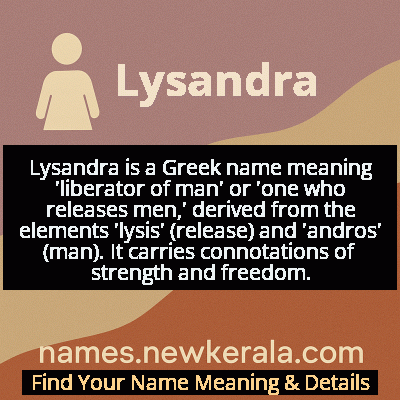Lysandra Name Meaning & Details
Origin, Popularity, Numerology Analysis & Name Meaning of Lysandra
Discover the origin, meaning, and cultural significance of the name LYSANDRA. Delve into its historical roots and explore the lasting impact it has had on communities and traditions.
Name
Lysandra
Gender
Female
Origin
Greek
Lucky Number
4
Meaning of the Name - Lysandra
Lysandra is a Greek name meaning 'liberator of man' or 'one who releases men,' derived from the elements 'lysis' (release) and 'andros' (man). It carries connotations of strength and freedom.
Lysandra - Complete Numerology Analysis
Your Numerology Number
Based on Pythagorean Numerology System
Ruling Planet
Uranus (Rahu)
Positive Nature
Strong sense of order, loyal, practical, and disciplined.
Negative Traits
Stubborn, overly serious, rigid, and prone to feeling restricted.
Lucky Colours
Blue, gray.
Lucky Days
Saturday.
Lucky Stones
Blue sapphire.
Harmony Numbers
1, 7, 8.
Best Suited Professions
Managers, engineers, accountants, organizers.
What People Like About You
Dependability, discipline, practicality.
Famous People Named Lysandra
Lysandra of Macedon
Ancient Macedonian Princess
Daughter of Ptolemy I Soter, played significant role in early Hellenistic politics
Lysandra (Seleucid Queen)
Seleucid Queen
Known for political influence during Wars of the Diadochi
Lysandra (Literary Character)
Fictional Character
Main character in Mary Renault's 'The Persian Boy'
Name Variations & International Equivalents
Click on blue names to explore their detailed meanings. Gray names with will be available soon.
Cultural & Historical Significance
Extended Personality Analysis
Individuals named Lysandra often develop personality traits that reflect their name's meaning of 'defender of mankind.' They typically exhibit strong protective instincts, combined with intellectual curiosity and natural leadership abilities. Many Lysandras demonstrate exceptional problem-solving skills and strategic thinking, likely influenced by the name's association with historical figures known for political and military acumen. Their protective nature extends beyond physical safety to emotional and intellectual support, making them reliable friends and advocates. The classical origins of their name often instill a sense of historical consciousness and appreciation for tradition, which can manifest as interest in history, philosophy, or classical studies. Lysandras tend to be articulate communicators who can persuasively defend their positions while remaining open to different perspectives. Their combination of strength and compassion makes them effective in caregiving professions, education, or leadership roles where protecting and guiding others is essential. The name's rarity often contributes to a strong sense of individuality and self-confidence, as Lysandras learn to appreciate their unique identity from an early age.
Modern Usage & Popularity
In contemporary naming practices, Lysandra occupies a unique position as a classical name that remains distinctive without being obscure. While it has never reached mainstream popularity, it maintains a steady presence among parents seeking names with historical depth and strong meaning. The name sees occasional spikes in usage following popular media featuring classical themes, such as historical novels, films, or television series set in ancient Greece. Currently, Lysandra is most popular among educated, urban families who value cultural heritage and literary references. Its usage patterns show concentration in academic communities, artistic circles, and among families with Greek ancestry. Social media has helped maintain the name's visibility, with several influencers and content creators named Lysandra showcasing the name's modern applicability. The name's elegant sound and clear meaning make it appealing to parents looking for alternatives to more common classical names like Alexandra or Cassandra. Despite its sophistication, Lysandra remains accessible and pronounceable in most English-speaking contexts, contributing to its enduring, if niche, appeal.
Symbolic & Spiritual Meanings
Symbolically, Lysandra represents the convergence of ancient wisdom and contemporary strength. The name embodies the archetype of the guardian—not just in physical terms but as a protector of knowledge, culture, and moral values. Metaphorically, it suggests a bridge between classical ideals and modern applications of protection and leadership. The 'defender' aspect extends symbolically to include advocacy for justice, preservation of heritage, and safeguarding of vulnerable communities. In psychological terms, the name carries connotations of resilience, strategic thinking, and emotional intelligence. The classical Greek origins lend it symbolic connections to democracy, philosophy, and the foundational principles of Western civilization. For many, the name evokes images of strong columns—representing both support and beauty—making it symbolic of enduring strength combined with aesthetic grace. The metaphorical meaning encompasses the idea of measured protection: knowing when to shield and when to empower, when to defend traditions and when to embrace progress. This rich symbolic tapestry makes Lysandra a name that speaks to both personal strength and broader social responsibility.

